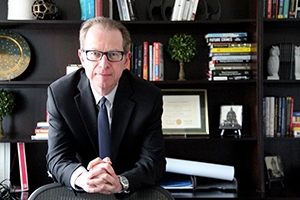Business
Diamonds Are Forever

American University's Kogod School of Business is celebrating its 60th anniversary in 2015. On Friday, April 17, Kogod will hold a birthday party with balloons and cake at the Massachusetts Avenue Terrace. Kogod kicked off this year's festivities with a lecture from Ronnie Mervis, a local radio personality and CEO of Mervis Diamond Importers (in keeping with the 60th "diamond anniversary" theme). For the occasion of the business school's special year, Dean Erran Carmel sat down with University Communications for a wide-ranging discussion about the past, present, and future of Kogod.
UC: As you look back on 60 years, what do you think is Kogod's legacy?
Carmel: "We are the first business school in the district, and we have one of the first international business programs, certainly in the region and in the country as well. We've had one of the strongest real estate programs in our business school."
UC: Can you talk about how the business school got its name?
Carmel: "Bob Kogod has been so much a part of this school. And his story is really very much intertwined with the 60 year history of Kogod. He was one of our early students, graduating in the class of '62. By then, he was already working in the family business that he married into, the Charles E. Smith Company. It was already successful, and it became one of the most successful real estate companies in the United States. It built Crystal City, and so much around Washington. Bob Kogod became very wealthy, very quickly, and he endowed this school in 1979 with a gift. At that point, it was the Kogod College of Business Administration. We changed our name slightly after this. And Bob is still very much involved with the school."
UC: What's your vision for the future of Kogod?
Carmel: "The vision I'm laying out is what we call Business in the Capital. When we started 60 years ago, we were the only business school in town. Now, in the region, there are many physical business schools to compete with us. So we will be distinctive around Business in the Capital. We will be the destination for everybody in the city when they want to find out about business in the greater D.C. area. And they'll come to us, and we will be the address for that. We will generate knowledge about the greater D.C. area, and we will build excellence. In addition to being a big generalist business school, we have everything from accounting to entrepreneurship to technology."
UC: What are some of the popular degree programs here?
Carmel: "International business has always been popular, and that makes sense because our students are quite cosmopolitan. Marketing is quite popular these days, especially as a second degree. Finance and accounting are very strong now. And then we have some of the more boutique, specialized majors that really catch the ears of the students, such as the new 'business and entertainment' major. Now, with the new incubator, entrepreneurship has been given a whole new life."
UC: Can you elaborate on the Sustainable Entrepreneurship and Innovation Initiative and the new incubator?
Carmel: "We teach business. It's a hands-on, experiential learning process. We have to get students out of the classroom and have them touch business. A startup really gets them excited about business and entrepreneurship. And even if they never end up becoming entrepreneurs, they learn so much about business just by going through that."
UC: Have you tried to encourage alumni involvement with this?
Carmel: "The alumni are falling over themselves to try to be involved in this. And we instantly have an advisory board of seasoned people for the entrepreneurship initiative. Many of the board members are serial entrepreneurs."
UC: Would you identify some outstanding academic scholarship that has recently come out of Kogod?
Carmel: "Let me start with some of the research in marketing. Sonya Grier does some very interesting work on gentrification in urban areas. She just did a film, which is wonderful. I like the video because I think it speaks to how professors are making impacts in new ways. Cristel Russell looks at how we consume advertising and information about products. Manoj Hastak works a lot on how advertising and packaging content influences consumers in perhaps the wrong way. On tax matters, Don Williamson has focused on the impact of tax policy on small businesses rather than the usual perspective of looking at large corporations."
UC: Have you been enjoying your time as Kogod dean?
Carmel: "I really love the job. It's very different from the life of a professor. Even though I'm in the same building, it's a completely different day. But it's stimulating and challenging. I'm doing a lot of this because I have been here for 20 years. This is a place that I feel very connected to, and I think that's one of the drivers that helps me move forward."
UC: If you had to generalize, what type of undergraduate student enrolls at Kogod?
Carmel: "Young students who got drawn into business and economics early on, and who want to explore more about these subjects. Most of them don't have very much exposure to business, and so it's really the beginning of their exploration. Some people come from family businesses and they are very much influenced by that."
UC: In addition to students who want to enter the business world, do you find a lot of students interested in social progress?
Carmel: "We have a graduate program in sustainability management. One career path students choose is to be a chief sustainability officer. But it's not just in sustainability. I think the dream of every student who comes into the program is to really make a broad impact. These are people who have a strong social mission to their lives, and these are the kinds of students we attract and want to help."
